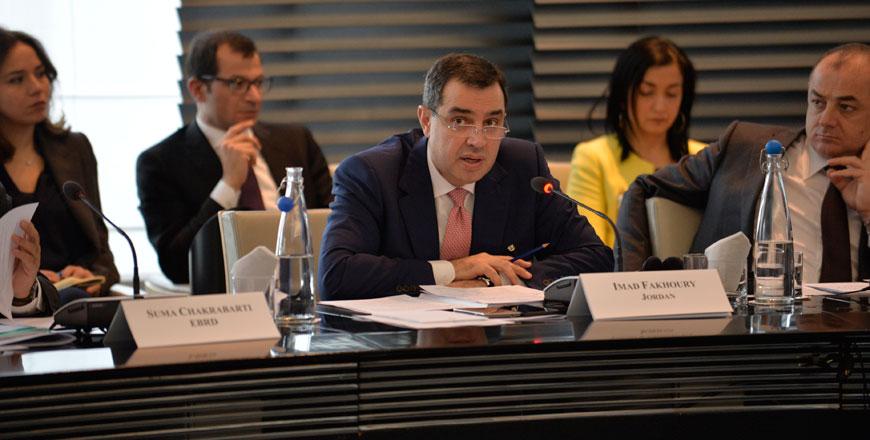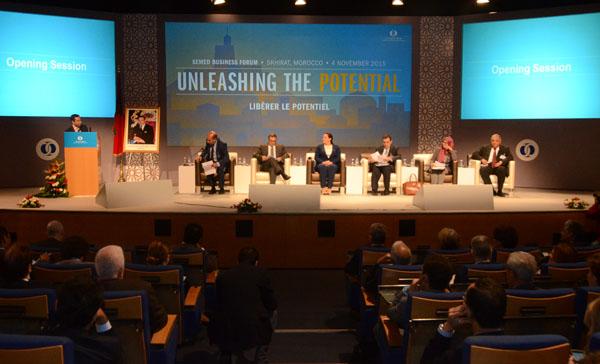You are here
Jordan wants investments to benefit Jordanians, Syrians — Fakhoury
By JT - Feb 03,2016 - Last updated at Feb 03,2016

Planning and International Cooperation Minister Imad Fakhoury speaks at a conference in London organised by the European Bank for Reconstruction and Development on Wednesday (Photo courtesy of Ministry of Planning and International Cooperation)
AMMAN — Jordan is working on an approach to turn the refugee crisis into a development opportunity, Planning and International Cooperation Minister Imad Fakhoury said on Wednesday.
"We are open for business and we want new investments that will create jobs for Jordanians and initiatives that can create also jobs for Syrian refugees in a manner that is not at the expense of Jordanians and in areas where Jordan has non-Jordanian labour," Fakhoury said at a conference hosted by the European Bank for Reconstruction and Development (EBRD) in London.
He stressed the need to create economic value to benefit "our citizens".
The minister outlined Jordan's approach to engage the private sector in the Kingdom's economic response to the Syrian refugee crisis.
He said the Jordanian holistic approach on the economic response to the Syrian refugee crisis is based on three main pillars, according to a ministry statement.
The first is turning the Syrian refugee crisis into a development opportunity that attracts new investments and opens up the EU market with simplified rules of origin and creates jobs for Jordanians and Syrian refugees whilst supporting the post-conflict Syrian economy.
The second pillar is rebuilding Jordanian host communities by adequately financing, through grants, the Jordan Response Plan (2016-2018) to ensure the resilience of host communities.
The third pillar entails mobilising sufficient grants and concessionary financing to support the macroeconomic framework and to address Jordan’s financing needs over the next three years as it enters a new Extended Fund Facility agreement with the IMF.
Jordan has been working with the international community to engage the private sector through the creation of a "compact" that provides benefits for both investors and refugees, Fakhoury added.
The benefits, he said, include access to an expanded, formal workforce as Syrian refugees will be provided with work permits and allowed to work in Special Economic Zones as well as labour-intensive sectors.
Other benefits include additional incentives for early mover investors through grants for training and visas to incentivise job creation, improved trade access to the EU for goods and services made in Jordan and access to expanded public procurement programmes.
"This increased activity will benefit refugees, Jordan as a country, as well as the region," he said.
"We are open to improving the conditions necessary for the private sector to deepen its economic engagement in our country... and we are committed to doing what it would take for you to seriously consider Jordan as a place in which to grow your respective businesses in a way that benefits the refugees and our nation," Fakhoury added.
The conference called for a new approach to tackle the refugee crisis caused by the Syrian civil war, an EBRD statement said.
EBRD President Sir Suma Chakrabarti opened the conference by announcing plans for a financing package worth 900 million euros for Turkey and Jordan, two of the EBRD countries that have been most seriously affected by the exodus of Syrians escaping from the violence in their home country.
The bank would be able to finance up to 500 million euros in new transactions subject to mobilising an additional 400 million euros in grants, Chakrabarti said.
The conference — also attended by Muhammed Murtaza Yetiş, chief adviser to the Turkish premier on refugees and humanitarian aid, and Lebanon's Education Minister Elias Bou-Saab — stressed the importance of engaging the private sector in helping to address the immediate infrastructure requirements caused by the influx of refugees and also helping to create jobs, especially by the development of labour intensive small- and medium-sized enterprise.
Private sector involvement would also bring necessary skills to economic development and help reduce the impact of responding to the crisis on stretched public sector budgets, the conference concluded.
Business representatives at the conference stressed that governments have to take steps to make it easier for the private sector to operate by responding more quickly to rapidly changing circumstances, the statement said.
Speakers said that in the development of small business, special emphasis has to be put on firms employing women and youth who constitute a large share of the refugees.
They called for programmes to identify refugees’ skills and match them with potential shortages in host countries.
The conference also discussed the role of the private sector in upgrading municipal services in an efficient and sustainable way.
Chakrabarti is scheduled to report on the conclusions of the EBRD conference and on the EBRD’s own proposals at the Supporting Syria and the Region conference 2016 in London on Thursday.
Related Articles
AMMAN — The government is serious about granting the private sector a leading role in running the development process, according to Planning
AMMAN — The European Bank for Reconstruction and Development (EBRD) has made “an exceptional decision” to provide Jordan with a share in a 1
Sir Suma Chakrabarti, president of the European Bank for Reconstruction and Development (EBRD), is scheduled to visit Jordan next Tuesday “to underscore the bank’s strong support for the country’s future economic development”, an EBRD statement said Wednesday.

















